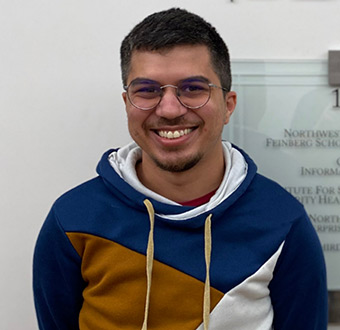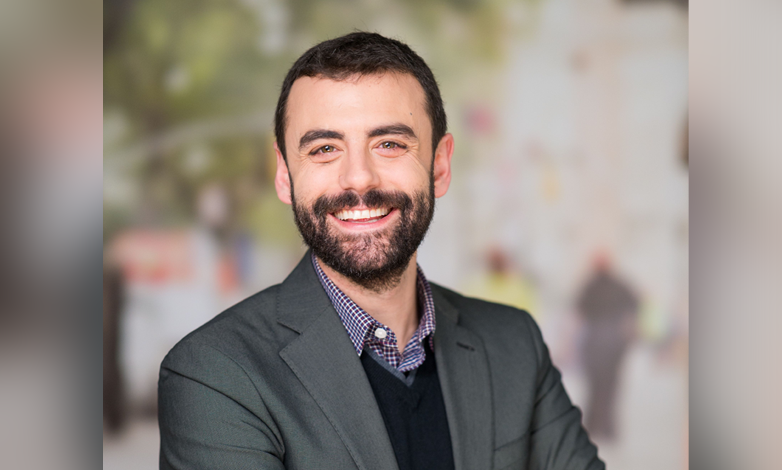Inter-CFAR IS Fellows

Abubaker Ibrahim Saeed (Ph.D. in Pharmacy Practice) a postdoctoral fellow at Massachusetts General Hospital, Boston, Massachusetts, USA. He has participated in a variety of research projects investigating rational medication use, patients’ adherence to treatment, chronic illness self-management and self-efficacy, and other topics related to public health issues. His career goal for the coming years is to focus on designing and implementing interventions to advance the science of pharmacoequity to reduce healthcare disparities in medication use.

Dr. alithia zamantakis is a postdoctoral fellow at Northwestern University's Institute for Sexual and Gender Minority Health and Wellbeing. She is trained as a sociologist and qualitative methodologist and received her doctorate from Georgia State University. Her postdoctoral work focuses on utilizing implementation science for ending the HIV epidemic through the production of generalizable knowledge with the Implementation Science Coordination Initiative (ISCI). Her research agenda comprises three aims: (1) analyzing gendered and racialized barriers to care for trans and nonbinary communities, (2) developing strategies to mitigate and dismantle structural determinants of health, and (3) examining the conditions that give rise to murders of and violence against Black trans women.

Artur Queiroz, Ph.D., (he/him) received his double Ph.D. in Public Health at the Escola Nacional de Saúde Pública at Universidade Nova de Lisboa and in Science at Universidade de São Paulo. His research focuses on social influences on sexual health, social networks, and HIV prevention. During his doctoral training, his dissertation examined structural, individual, and social barriers experienced by men who have sex with men in accessing HIV prevention. At ISGMH, he works primarily on the ISC3I and SMART projects. Artur is interested in multiple forms of HIV combined prevention as well as a comprehensive approach to the health of LGBTQIA+ people.
Dr. Amanda Blair Spence is an Assistant Professor of Infectious Diseases at Georgetown University Medical Center. She completed her medical degree and internal medicine residency at the University of Louisville. Dr. Spence completed her infectious disease fellowship training at MedStar Georgetown University Hospital. Her research focuses on the pathogenesis and management of comorbidities in persons living with HIV as well as improving HIV treatment and prevention along the care continuum. Her overall vision is that her research improves the lives and care of persons living with HIV, with an emphasis on women.

Brittney van de Water, PhD, RN, CPNP-PC is an Assistant Professor at Boston College Connell School of Nursing focusing on global health delivery and infectious disease research. She received her PhD from Duke University School of Nursing with a doctoral certificate in global health from the Duke Global Health Institute and completed a postdoctoral fellowship at Harvard Medical School, Department of Global Health and Social Medicine focused on pediatric TB epidemiology. She is a former Robert Wood Johnson Future of Nursing Scholar and Fellow. Brittney's current research focuses on improving TB/HIV program quality and implementation in low resource settings, mainly rural South Africa, where she has a NIH funded K23 award. She aims to use implementation science frameworks to deliver high quality healthcare to high-risk populations including children, pregnant women, people living with HIV, and household contacts of patients with TB.

Carly Comins, MPH is a second year PhD student in the Department of Epidemiology at Johns Hopkins School of Public Health. Her research focuses on understanding how to best support HIV prevention and treatment among marginalized populations through the implementation of evidence-based interventions and evidence-informed implementation strategies. She has over a decade of public health research experience including nine years of HIV-related epidemiologic research and program implementation among key populations across 15 countries. Currently, Ms. Comins is focused on understanding how individuals engage with HIV treatment support strategies, the role of engagement on sustained clinical outcomes, and the mechanisms through which implementation outcomes including fidelity, feasibility, and appropriateness influence sustained retention in HIV care and viral suppression.

Dr. Caroline Mullis (she/her) is a Postdoctoral Research Fellow and an Attending Physician in the Division of Infectious Diseases at the Montefiore Medical Center/ Albert Einstein College of Medicine. She completed her residency in Internal Medicine at the Icahn School of Medicine at Mount Sinai and her fellowship in Infectious Diseases at Montefiore Medical Center. Her clinical and research interest is to improve sexual health and HIV prevention services provided to cisgender women. Her current research focuses on enhancing the understanding of facilitators and barriers associated with PrEP use in the postpartum period with the aim to understand how to utilize postpartum healthcare interactions to deliver HIV prevention and PrEP services to cisgender women.

Dr. Charlie Burns MD is an Assistant Professor of Medicine in the Division of Infectious Diseases at Duke University. Clinically he is interested in general infectious diseases especially HIV and medical education. His research interests include HIV prevention and health services research with a focus on novel access points to HIV pre-exposure prophylaxis and re-engagement of persons with HIV into clinical care.

Dr. Dana Watnick, PhD, MPH, MSSW is an Assistant Professor of Pediatrics at Albert Einstein College of Medicine and serves as the Director of Research at the Behavioral and Implementation Science Core at the ERC CFAR in New York City. Dr. Watnick’s research focuses on the integration of family planning and HIV/STI prevention activities, both in community and clinical settings. She is particularly interested in differentiated service delivery models for PrEP, contraception and multipurpose prevention technologies, to optimize care pathways and health outcomes.

Dr. Danielle Giovenco is currently a T32 postdoctoral fellow at Emory’s Rollins School of Public Health. She recently earned her PhD in Epidemiology from the University of North Carolina at Chapel Hill in 2021 and her ScM in Behavioral and Social Health Sciences from Brown University in 2016. She is also a research fellow at the Desmond Tutu Health Foundation (DTHF) in Cape Town, South Africa. Her research involves developing and implementing HIV prevention and care interventions among adolescents and young people globally. Her doctoral and postdoctoral work to date has been focused on 1) estimating social and behavioral factors associated with oral PrEP use and HIV risk among young people in South Africa and 2) exploring the utility of novel interventions to engage and retain South African young people in HIV prevention and care services, particularly in the context of the COVID-19 pandemic.

Greg Rosen, MSPH (he/him/his), is a fourth-year PhD candidate in the Department of International Health at Johns Hopkins University Bloomberg School of Public Health. Greg’s research uses mixed methods and implementation science frameworks to strengthen delivery of HIV and harm reduction interventions for marginalized populations, including people who sell sex and/or use drugs. His doctoral research uses quantitative and qualitative methods to characterize population-level dynamics in HIV viremia following the implementation of Universal Test and Treat (“Treat All”) in Rakai, Uganda. Prior to his doctoral studies, Greg worked as a data analyst within the Office of HIV/AIDS at USAID and later as a Health Research Officer for Population Council (Zambia), where he supported a large portfolio of implementation science research focused on adolescent sexual and reproductive health. He is currently supported by an NIMH F31 training grant and serves as the Prevention Core Senior Manager of the JHU CFAR.

Dr. Harita Shah is a primary care physician and an Assistant Professor in Internal Medicine and Pediatrics at the University of Chicago. Prior to her faculty position, she attended Johns Hopkins for medical school and the Urban Health Medicine-Pediatrics residency program. Her research focuses on the combination of community based participatory research and implementation science to address disparities in HIV prevention and outcomes, as well as COVID-19 outcomes, for underserved populations. She is currently the director of two community-engaged social media campaigns: the PrEPárate campaign promoting access to PrEP among Latino/a/x sexual and gender minorities in Chicago (preparate.info), as well as the Mejor Vive Sin Duda campaign promoting access to COVID-19 services for Latino/a/x immigrant communities in Maryland (sinduda.org).

Dr. Helen Jack, MD is a primary care physician and Acting Instructor in the Division of General Internal Medicine at University of Washington. Her research focuses on expanding access to mental health and substance use treatment in primary healthcare settings for historically marginalized populations both in the United States and southern Africa. She has been conducting mental health research in Zimbabwe since 2013 and is currently supported by an NIMH K23 to study the implementation of the WHO depression treatment guidelines in Zimbabwean primary care clinics. Dr. Jack’s clinical work is in primary care in a state prison in rural eastern Washington, and her domestic research is increasingly focused on criminal justice settings, including an ongoing EHE supplement exploring how to link people releasing from prison with community-based HIV prevention and behavioral health services. She attended Harvard Medical School, has an MA from Oxford University in Philosophy, Politics, and Economics, and completed Internal Medicine residency at University of Washington.

Dr. Jessica Perkins (she/her) is an Assistant Professor in the Department of Human and Organizational Development at Peabody College, Vanderbilt University and a Faculty Affiliate at Vanderbilt Institute of Global Health. She earned her PhD in Health Policy from Harvard University, her MS in Population and International Health from Harvard School Public Health, and her bachelor’s degree in Psychology from Davidson College. Dr. Perkins’ main research areas focus on social networks and social norms as drivers of HIV prevention and treatment and co-occurring behaviors and attitudes (i.e., substance use, violence, and stigma), with an emphasis on designing interventions to change misperceived social norms and facilitate individual and collective change.

Julie Schexnayder, DNP, PhD, MPH, CRNP, is an Assistant Professor in the School of Nursing at the University of Alabama at Birmingham (UAB). Her research focuses on the design and evaluation of preventive care interventions to reduce cardiometabolic health inequities among vulnerable populations, including persons living with HIV. Through her research, Dr. Schexnayder aims to innovate HIV tailored obesity prevention and treatment services using multi-level and mixed method approaches.

Dr. Kathleen McManus, MD, MSCR is an Assistant Professor of Infectious Diseases and International Health at the University of Virginia (UVA). She was awarded a K08 Mentored Career Development Award from the National Institute of Allergy and Infectious Diseases to study the effects of the Affordable Care Act on low-income people living with HIV and to quantify how changes in health policy impact disparities in HIV care. Her work has also been supported by the Agency for Healthcare Research and Quality. Dr. McManus is a co-chair of the HIV Medical Association's national Ryan White HIV Medical Providers Coalition Steering Committee and the Chair of the Virginia Department of Health’s AIDS Drug Assistance Program Advisory Committee. As a clinician, she provides medical care to people with HIV at the UVA Ryan White HIV clinic. Her career goal is to build a vibrant and diverse team of researchers who quantify and characterize the impact of health policies on the United States' plan to end the HIV epidemic.

Kelly Gagnon, PhD MPH is a postdoctoral fellow in the Division of Infectious Disease at the University of Alabama at Birmingham (UAB). She received her PhD in Behavioral and Community Health Sciences from the University of Pittsburgh Graduate School of Public Health. Her primary research interest is the implementation of screening and evidence-based practices to prevent and treat human immunodeficiency virus (HIV) and sexually transmitted infections (STIs), particularly among hardly reached populations such as sexual and gender minorities. To date, her research focused on the evaluation of initiatives to integrate HIV screening and PrEP services using implementation science frameworks. As a postdoctoral fellow, she aims to gain experience conducting research to improve engagement along the care continuum for people with HIV and opioid use disorder (OUD) in the Deep South. Additionally, she is interested in exploring the role of stigma as a barrier to the use and advisement of harm reduction and prevention strategies among high-risk and HIV-positive populations in the Deep South.

Dr. Mary Clare Masters, MD is an Assistant Professor in the Department of Medicine, Division of Infectious Diseases at Northwestern University Feinberg School of Medicine. She completed medical school at Washington University School of Medicine in St. Louis, residency in Internal Medicine at the University of Chicago, and fellowship in Infectious Diseases at Northwestern University. Her research focus is on identifying and implementing interventions to reduce functional and cognitive impairment and promote resilience among older persons with HIV.

Dr. Minh Nguyen is a lecturer at the Department of Epidemiology, Hanoi Medical University, Vietnam. She is now also a fellow in the Fogarty postdoctoral fellowship program at the University of North Carolina – Chapel Hill. Her research focuses on the intersection between mental health and substance abuse in determining health outcomes of people living with HIV, as well as PrEP use and electronic health interventions to improve PrEP uptake among young men who have sex with men. She received her PhD in Health Behavior from the University of North Carolina – Chapel Hill Gillings School of Global Public Health and MS in Epidemiology from University of California, Los Angeles.

Phillip Marotta’s research focuses on the impact of the criminal justice system on disparities in public health, with an emphasis on substance use treatment interventions in justice-involved populations and the HIV care continuum for justice-involved persons with substance use disorders. Marotta examines medication-assisted treatments for opioid use disorder (OUD) in jails and prisons. Marotta recently received a National Service Award to examine the role of criminal justice involvement in retention, injection and sexual HIV risk behaviors, using data from three HIV prevention clinical trials with people who use drugs. Prior to his time at the Brown School, Marotta was a postdoctoral research fellow at Yale School of Medicine.

Dr. Pieter Baker, PhD, MPH, is a Postdoctoral Research Fellow in the Department of Epidemiology at Johns Hopkins University, School of Public Health. He received his MPH (Infectious Disease Epidemiology Track) from Columbia University and his PhD in Public Health (Global Health Track) from the University of California, San Diego. His primary research interests include drugs, germs, and justice. His current work focuses on the role of drug law enforcement on the risk environment for HIV and other drug-related harms among people who inject drugs. He works on the Aids Linked to the Intravenous Experience (ALIVE) study and is supported by the NIH-funded HIV Epidemiology and Prevention Sciences Training Program (T32AI102623).

Dr. Preeti Manavalan, MD, MSc, is an Assistant Professor of Medicine within the Division of Infectious Diseases & Global Medicine at the University of Florida. She completed her medical training at Howard University College of Medicine and her Internal Medicine residency training at Yale University. She stayed on as a Chief Resident at Yale and completed her Infectious Diseases Fellowship at Duke University. She is a previous Fogarty Global Health Fellow and has a special interest in HIV, HIV-related chronic diseases, and global health. Her current research focuses on developing, implementing, and evaluating novel and scalable behavioral interventions that contribute to Ending the HIV Epidemic in underserved populations.

Dr. Ruvandhi Nathavitharana is an Assistant Professor at Beth Israel Deaconess Medical Center (BIDMC) and Harvard Medical School. Dr. Nathavitharana’s research on tuberculosis (TB), funded primarily by an NIH/NIAID K23 award, focuses on the use of implementation science to optimize TB diagnosis and improve TB care delivery in Peru and South Africa. Dr. Nathavitharana is a co-investigator for the Rapid Research in Diagnostics Development for TB Network (R2D2 TB Network), which focuses on identifying, evaluating, and advancing the most promising novel TB diagnostics. Dr. Nathavitharana has served as a technical expert analyzing data to inform WHO guideline development group panel recommendations on the accuracy of line probe assays for the diagnosis of TB and the impact of the urine lipoarabinomannan test. Dr. Nathavitharana also serves the Chair of TB Proof, an advocacy organization, based in South Africa, whose mission seeks to combine stories and science to destigmatize TB and mobilize national and global resources to end TB.

Dr. Tiffany Glynn, PhD (she/her) is a NIAID T32 Postdoctoral Fellow at Harvard Medical School with a joint appointment in Psychiatry/Behavioral Medicine at Massachusetts General Hospital, Emergency Medicine at Brigham and Women’s Hospital, and Fenway Health. Dr. Glynn received her PhD in clinical health psychology from the University of Miami and MS from the Brown University School of Public Health. Broadly, her research examines how biopsychosocial factors interact to drive health disparities among marginalized communities and multi-level interventions to work towards health equity. Most of her work examines the complex and ongoing HIV epidemics among transgender women, sexual minority men, and those economically marginalized.

Dr Tonderai Mabuto is a Senior Research Scientist at the Aurum Institute, South Africa, where he specialises in implementation science research. His passion is for the use of evidence-informed interventions and practices to improve service and client outcomes in routine healthcare programmes in Africa. Dr Mabuto’s work spans several countries in Africa, and includes key populations for HIV and Tuberculosis, and populations with high unmet need for accessible HIV care and support. He holds a PhD in Public Health from the University of Witwatersrand.